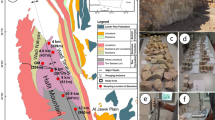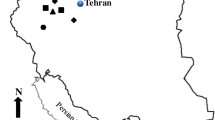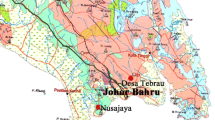Abstract
The unconfined compressive strength (UCS) of intact rocks is an important geotechnical parameter for engineering applications. Determining UCS using standard laboratory tests is a difficult, expensive and time consuming task. This is particularly true for thinly bedded, highly fractured, foliated, highly porous and weak rocks. Consequently, prediction models become an attractive alternative for engineering geologists. The objective of study is to select the explanatory variables (predictors) from a subset of mineralogical and index properties of the samples, based on all possible regression technique, and to prepare a prediction model of UCS using artificial neural networks (ANN). As a result of all possible regression, the total porosity and P-wave velocity in the solid part of the sample were determined as the inputs for the Levenberg–Marquardt algorithm based ANN (LM-ANN). The performance of the LM-ANN model was compared with the multiple linear regression (REG) model. When training and testing results of the outputs of the LM-ANN and REG models were examined in terms of the favorite statistical criteria, which are the determination coefficient, adjusted determination coefficient, root mean square error and variance account factor, the results of LM-ANN model were more accurate. In addition to these statistical criteria, the non-parametric Mann–Whitney U test, as an alternative to the Student’s t test, was used for comparing the homogeneities of predicted values. When all the statistics had been investigated, it was seen that the LM-ANN that has been developed, was a successful tool which was capable of UCS prediction.







Similar content being viewed by others
References
Åkesson U, Lindqvist JE, Göransson M, Stigh J (2001) Relationship between texture and mechanical properties of granites, central Sweden, by use of image-analysing techniques. Bull Eng Geol Environ 60:277–284
Altindag R, Alyildiz IS, Onargan T (2004) Technical note: mechanical property degradation of ignimbrite subjected to recurrent freeze-thaw cycles. Int J Rock Mech Min Sci 41:1023–1028
Alvarez Grima M, Babuska R (1999) Fuzzy model for the prediction of unconfined compressive strength of rock samples. Int J Rock Mech Min Sci 36:339–349
Ameen MS, Smart BGD, Somerville JMC, Hammilton S, Naji NA (2009) Predicting rock mechanical properties of carbonates from wireline logs (A case study: Arab-D reservoir, Ghawar field, Saudi Arabia). Mar Petrol Geol 26:430–434
Asef MR, Farrokhrouz M (2010) Governing parameters for approximation of carbonates UCS. Electron J Geotech Eng 15:1581–1592
Barton N (2007) Fracture-induced seismic anisotropy when sharing is induced in production from fractured reservoirs. J Seism Explor 16:115–143
Baykasoğlu A, Güllü H, Canakcı H, Ozbakır L (2008) Predicting of compressive and tensile strength of limestone via genetic programming. Expert Syst Appl 35:111–123
Bell FG (1978) The physical and mechanical properties of Fell sandstones, North-Umberland, England. Eng Geol 12:1–29
Bieniawski ZT (1974) Estimating the strength of rock materials. J S Afr Inst Min Metall 74:312–320
Brooks N (1985) The equivalent core diameter method of size and shape correction in point load test. Int J Rock Mech Min Sci Geomechan Abstr 22:61–70
Canakci H, Pala M (2007) Tensile strength of basalt from a neural network. Eng Geol 94:10–18
Ceryan S, Tudes S, Ceryan N (2008) A new quantitative weathering classification for igneous rocks. Environ Geol 55:1319–1336
Cevik A, Sezer EA, Cabalar AF, Gokceoglu C (2011) Modeling of the unconfined compressive strength of some clay-bearing rocks using neural network. Appl Soft Comput 11:2587–2594
Chang C, Zoback MD, Khaksar A (2006) Empirical relations between rock strength and physical properties in sedimentary rocks. J Petrol Sci Eng 51:223–237
D’Andrea DV, Fisher RL, Fogelsen DE (1965) Prediction of rock strength from other rock properties. US Bur Min Rep Invest, Washington DC, 6702:5–45
Dehghan S, Sattarı GH, Chehreh CS, Aliabadi MA (2010) Prediction of unconfined compressive strength and modulus of elasticity for Travertine samples using regression and artificial neural. Netw Min Sci Technol 20:0041–0046
Diamantis K, Gartzos E, Migiros G (2009) Study on uniaxial compressive strength, point load strength index, dynamic and physical properties of serpentinites from Central Greece: test results and empirical relations. Eng Geol 108:199–207
Doberenier L, De Freitas MH (1986) Geotechnical properties of weak sandstones. Geotechnique 36:79–94
Ellis GW, Yao C, Zhao R (1992) Neural network modelling of the mechanical behaviour of sand. In: Proceedings of Ninth Conference ASCE Engng Mech. ASCE New York, pp 421–424
Fahy MP, Guccione MJ (1979) Estimating strength of sandstone using petrographic thin-section data. Bull Assoc Eng Geol 16:467–485
Fistikoglu O, Okkan U (2011) Statistical downscaling of monthly precipitation using NCEP/NCAR reanalysis data for Tahtali River basin in Turkey. ASCE J Hydrol Eng 16(2):157–164
Garret JH Jr (1994) Where and why artificial neural networks are applicable in civil engineering. J Comput Civil Eng ASCE 8(2):129–130
Gaviglio P (1989) Longitudinal waves propagation in a limestone: the relationship between velocity and density. Rock Mech Rock Eng 22:299–306
Ghabousi J, Garret JH, Wu X (1991) Knowledge based modeling of material behavior with neural networks. ASCE J Eng Mech 171(1):132–153
Gokceoglu C (2002) A fuzzy triangular chart to predict the unconfined compressive strength of the Ankara agglomerates from their petrographic composition. Eng Geol 66:39–51
Gokceoglu C, Zorlu K (2004) A fuzzy model to predict the unconfined compressive strength and modulus of elasticity of a problematic rock. Eng Appl Artif Intell 17:61–72
Gokceoglu C, Ulusay R, Sonmez H (2000) Factors affecting durability of the weak and clay-bearing rocks selected from Turkey with particular emphasis on the influence of the number of drying and wetting of cycles. Eng Geol 57(3–4):215–237
Gundoğdu N (1982) Geological, mineralogical and geochemical analysis of Bigadic sedimentary basin aged Neojen. PhD thesis, Hacettepe University, Ankara, Turkey (in Turkish)
Hagan MT, Menhaj MB (1994) Training feed forward techniques with the Marquardt algorithm. IEEE Trans Neural Netw 5(6):989–993
Ham F, Kostanic I (2001) Principles of neurocomputing for science and engineering. Mcgraw-Hill, USA
Hawkins A, McConnell BJ (1990) Influence of geology on geomechanical properties of sandstones. In: 7th International congress on rock mechanics, Balkema, Rotterdam, pp 257–260
Hinnes WW, Montgomery DC (1990) Probability and statistics in engineering and management science. John Wiley & Sons, Singapore
Huang Y, Wanstedt S (1998) The introduction of neural network system and its applications in rock engineering. Eng Geol 4:253–260
International Society for Rock Mechanics (ISRM) (1981) In rock characterization, testing and monitoring—ISRM suggested methods. In: Brown ET (ed), Oxford Pergamon, p 211
International Society for Rock Mechanics (ISRM) (2007) The complete ISRM suggested methods for rock characterization, testing and monitoring: 1974–2006. In: Ulusay R, Hudson JA (eds) Suggested methods prepared by the commission on testing methods, International Society for Rock Mechanics. ISRM Turkish National Group. Ankara, Turkey
Jensen LRD, Friis H, Fundal E, Mǿller P, Jespersen M (2010) Analysis of limestone micromechanical properties by optical microscopy. Eng Geol 110(3–4):43–50
Kahraman S (2001) Evaluation of simple methods for assessing the unconfined compressive strength of rock. Int J Rock Mech Min Sci 38:981–984
Kahraman S, Alber M (2006) Estimating the unconfined compressive strength and elastic modulus of a fault breccia mixture of weak rocks and strong matrix. Int J Rock Mech Min Sci 43:1277–1287
Kahraman S, Gunaydin O, Alber M, Fener M (2009) Evaluating the strength and deformability properties of Misis fault breccia using artificial neural networks. Expert Syst Appl 36:6874–6878
Kahraman S, Alber M, Fener M, Gunaydin O (2010) The usability of Cerchar abrasivity index for the prediction of UCS and E of Misis fault breccia: regression and artificial neural networks analysis. Expert Syst Appl 37:8750–8756
Lama RD, Vutukuri V (1978) Handbook on mechanical properties of rocks. Vol 2, Trans Tech Publication. ISBN-13:978–0878490233
Lindqvist JE, Åkesson U (2001) Image analysis applied to engineering geology, a literature review. Bull Eng Geol Environ 60:117–122
Mallows CL (1973) Some comments on Cp. Technometrics 15(4):661–675
Mann HB, Whitney DR (1947) On a test of whether one of two random variables is stochastically larger than the other. Ann Math Stat 18:50–60
Marquardt D (1963) An algorithm for least squares estimation of non-linear parameters. J Soc Ind Appl Math 11(2):431–441
McQuarrie AD, Tsai C (1998) Regression and time series model selection. World Scientific Publishing Co., Pte. Ltd, River Edge
Meulenkamp F (1997) Improving the prediction of the UCS by Equotip readings using statistical and neural network models. Memoirs of the centre for engineering geology in the Netherlands, vol 162, p 127
Meulenkamp F, Alvarez Grima M (1999) Application of neural networks for the prediction of the unconfined compressive strength (UCS) from Equotip hardness. Int J Rock Mech Min Sci 36:29–39
Moh’d BK (2009) Compressive strength of vuggy oolitic limestones as a function of their porosity and sound propagation. Jordan J Earth Environ Sci 2:18–25
Moradian Z, Behnia M (2009) Predicting the unconfined compressive strength and static young’s modulus of intact sedimentary rocks using the ultrasonic tests. Int J Geomech ASCE 9:1–14
Neter J, Kutner M, Nachtsheim C, Wasserman W (1996) Applied linear statistical models. McGraw-Hill Companies, Inc, NY
Nie X, Zhang Q (1994) Prediction of rock mechanical behaviour by artificial neural network. A comparison with traditional method. In: IV CSMR, Integral Approach to Applied Rock Mechanics. Santiago, Chile
Okkan U (2011) Application of Levenberg-Marquardt optimization algorithm based multilayer neural networks for hydrological time series modeling. An Int J Optim Control Theor Appl 1(1):53–63
Okkan U, Dalkilic HY (2011) Reservoir inflows modeling with artificial neural networks: the case of Kemer Dam in Turkey. Fresenius Environ Bull 20(12):3110–3119
Oyler DC, Mark C, Melinda GM (2010) In situ estimation of roof rock strength using sonic logging. Int J Coal Geol 83:484–490
Romana M (1999) Correlation between unconfined compressive and point-load (Franklin tests) strengths for different rock classes. In: 9th ISRM Congress, 1. Balkema, Paris, pp 673–676
Saito T, Mamoru ABE, Kundri S (1974) Study on weathering of igneous rock. Rock Mech Jpn 2:28–30
Sarkar K, Tiwary A, Singh TN (2010) Estimation of strength parameters of rock using artificial neural networks. Bull Eng Geol Environ 69:599–606
Shakoor A, Bonelli R (1991) Relationship between petrographic characteristics, engineering index properties and mechanical properties of selected sandstones. Bull Assoc Eng Geol 28:55–71
Sharma S (1996) Applied multivariate techniques. John Willey & Sons, Inc, Canada
Singh TN, Dubey R (2000) A study of transmission velocity of primary wave (P-Wave) in Coal Measures sandstone. J Sci Ind Res India 59:482–486
Singh A, Harrison A (1985) Standardized principal components. Int J Remote Sens 6:883–896
Singh VK, Singh D, Singh TN (2001) Prediction of strength properties of some schistose rocks from petrographic properties using artificial neural networks. Int J Rock Mech Min Sci 38:269–284
Sonmez H, Tuncay E, Gokceoglu C (2004) Models to predict the unconfined compressive strength and the modulus of elasticity for Ankara Agglomerate. Int J Rock Mech Min Sci 41(5):717–729
Temel A, Gundogdu MN (1996) Zeolite occurrences and the erionite–mesothelioma relationship in Cappadocia, Central Anatolia, Turkey. Miner Deposita 31:539–547
Tiryaki B (2008) Predicting intact rock strength for mechanical excavation using multivariate statistics, artificial neural networks and regression trees. Eng Geol 99(1–2):51–60
Ulusay R, Tureli K, Ider MH (1994) Prediction of engineering properties of a selected litharenite sandstone from its petrographic characteristics using correlation and multivariate statistical techniques. Eng Geol 37:135–157
Ulusay R, Gokceoglu C, Sulukcu S (2001) ISRM suggested method for determining block punch index (BPI). Int J Rock Mech Min Sci 38:1113–1119
Yagiz S, Sezer EA, Gokceoglu C (2012) Artificial neural networks and nonlinear regression techniques to assess the influence of slake durability cycles on the prediction of uniaxial compressive strength and modulus of elasticity for carbonate rocks. I J Numer Anal Method Geomech. doi:10.1002/nag.1066
Yilmaz I (2010) Use of the core strangle test for tensile strength estimation and rock mass classification. Int J Rock Mech Min Sci 47(5):845–850
Yilmaz I, Yuksek AG (2008) An example of artificial neural network (ANN) application for indirect estimation of rock parameters. Rock Mech Rock Eng 41(5):781–795
Yilmaz I, Yuksek AG (2009) Prediction of the strength and elasticity modulus of gypsum using multiple regression, ANN and ANFIS models. Int J Rock Mech Min Sci 46(4):803–810
Youash Y (1970) Dynamic, physical properties of rocks: Part 2. Experimental result. Proc 2nd Congr Int Soc Rock Mech Beograd 1:185–195
Zorlu K, Gokceoglu C, Ocakoglu F, Nefeslioglu HA, Acikalin S (2008) Prediction of unconfined compressive strength of sandstones using petrography-based models. Eng Geol 96:141–158
Author information
Authors and Affiliations
Corresponding author
Rights and permissions
About this article
Cite this article
Ceryan, N., Okkan, U. & Kesimal, A. Prediction of unconfined compressive strength of carbonate rocks using artificial neural networks. Environ Earth Sci 68, 807–819 (2013). https://doi.org/10.1007/s12665-012-1783-z
Received:
Accepted:
Published:
Issue Date:
DOI: https://doi.org/10.1007/s12665-012-1783-z




